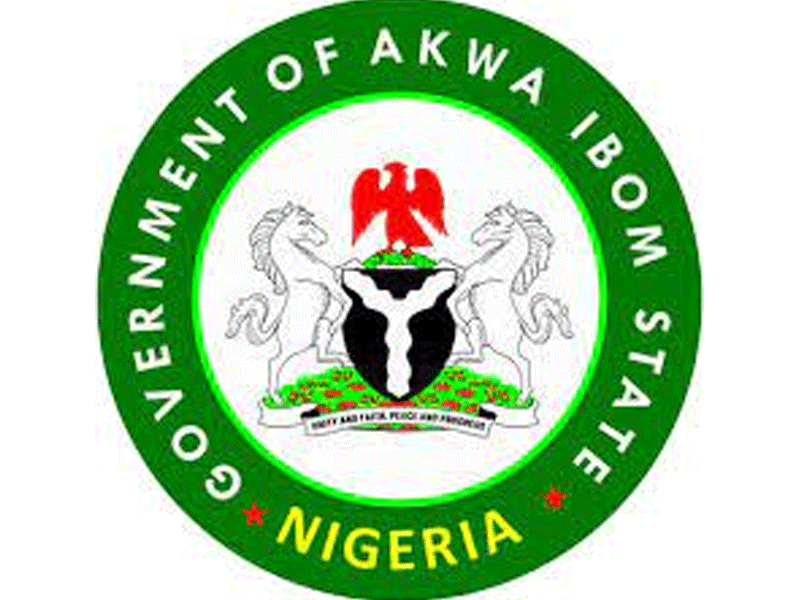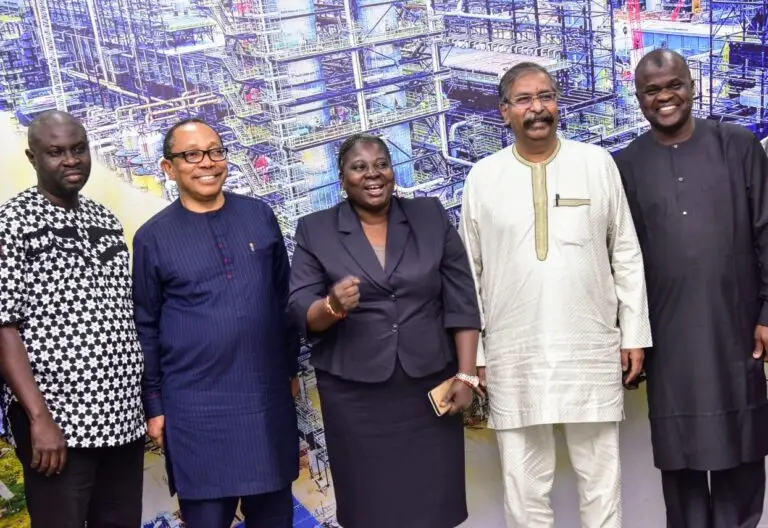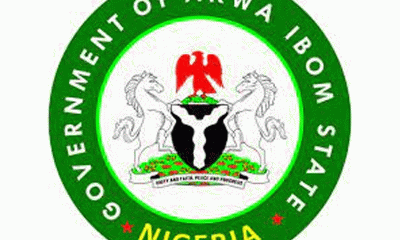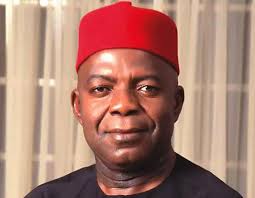NEWS
FEC Approves N6.2bn for FCT Projects, 40 Scan Devices for NAFDAC

The Federal executive Council (FEC) presided over by President Muhammadu Buhari on Wednesday approved N5.9 billion for execution of three projects by the Federal Capital Territory (FCT).
Minister of the FCT, Malam Mohammed Bello, made this known when he briefed State House correspondents on the outcome of the Council meeting in Abuja.
He said N2.
3billion of the amount was meant for rehabilitation of the road leading to the Federal Integrated Staff Housing Estate in Apo, Abuja, while N3.6billion was approved for the construction of an access road and car park for the Abuja light rail station at ring road II.The minister said: “During today’s Federal Executive Council meeting, I presented three memos, two of which were on infrastructure and the other was for the purchase of needed equipment to make the city safe.
“The first was for a contract to rehabilitate the road leading to the Federal Integrated Staff Housing Estate in Apo, Abuja, and that contract was approved at the sum of N2.3 billion with a completion period of 24 months.
“As you know, the Federal Integrated Staff Housing Estates are being constructed in some locations in Abuja under the office of the Head of civil Service of the Federation and these estates are intended to provide needed accommodation to federal civil servants.
“The second infrastructure project relates to the contract for the construction of an access road and car park for the Abuja light rail station at ring road II otherwise known as Kukwaba station, which you see on the airport expressway immediately after the city gate near the Kukwaba recreation park under the Ministry of Aviation. The contract was approved for N3.6 billion, with a completion period of 18 months.
“The intention is that by the opening of that road, that railway station can be made functional and then commuters can use the station either when they visit the national park there or they want to have access to the Kukwaba district.”
He further revealed that the Council approved N3.07billion for the purchase of two towing vehicles and a crane for use by the Directorate of Road Traffic Services in the FCT.
“The third is for the purchase of two heavy duty tow vehicles with mounted crane for the Directorate of Road Traffic Services otherwise called Vehicle Inspection Officers (VIO), under the FCT and that particular contract was approved at a total sum of N3,072,466,000 with a duration period for the supply put at six weeks,” he said.
On his part, the Minister of Health, Dr Osagie Ehanire, said the two memos for the National Agency for Food and Drug Administration (NAFDAC) he presented at the meeting, were approved by the Council.
According to Ehanire, the memos are procurement memos meant to upgrade and scale up the capacity of NAFDAC to be able to detect fake and substandard drugs and other materials.
He said: “The first memo was for procurement of about 40 scam devices, which are mobile scan devices to be able to recognise fake and substandard drugs brought in either across the border or found within the country.
“These are like rapid diagnostic kits tests, which also relieve the laboratories because normally you have to take samples to the laboratories, it takes a long time, several days and lead to some delays. So having a through scan allows us to have faster access.
“The second memo is about laboratory strengthening, improving and upgrading all of our six laboratories for NAFDAC for for testing materials that are brought into the country.
“Both of these contribute strongly to what we call the bench benchmarks for NAFDAC to be able to allow the manufacture of vaccines in Nigeria.
“It needs what we call the maturity level 3 of the World Health Organisation, to be able to start manufacturing, we have ambitions to start manufacturing vaccines and the federal government owns 49% of shares in the company called Bio-Vaccines that hopes to use technology imported from outside to make vaccines and getting this benchmark maturity level 3 is a condition for it.
“So both of these memos, the upscaling of laboratory capacity and the ability to speed up and make diagnostics more accurate in respective of fake and substandard drugs, will help us to push to apply for maturity level 3 for the health sector.’’
On Nigeria’s access to COVID-19 vaccines, the ministers said the vaccines would be supplied to the country through three sources, namely; the COVAX facility set up by the World Health Organisation and Global Alliance for vaccines and immunization (GAVI); African Vaccine Acquisition Task Team (AVATT) and through bilaterals
He said the vaccines would be provided to Nigerians free-of-charge, saying the COVAX facility would cover about 20 per cent of the nation population with vaccines.
“Now, the COVAX will start delivering to African countries before the end of February, that’s what they told us. But they didn’t tell us which country is first or which is second, which is third.
“So COVAX begins to deliver before the end of February. We hope that before the end of this month it would be our turn or latest by beginning of next month.
“As for us here, we are ready to use vaccination once it arrives, we met all the conditions.
“They have asked us to sign an indemnification form, we have done that. Indemnification means that you do not hold us responsible for anything that happens from using this vaccine. That’s a standard process.
“We have signed that indemnification and so we are waiting for the vaccines to arrive anytime.
“Now, the largest number of vaccines we are getting is AstraZeneca in Africa, and this AstraZeneca is made under the licence. It’s a UK vaccine but is manufactured under licence by the Serum Institute of India.
“So Serum Institute of India is donating all these vaccines,’’ he said. (NAN)
NEWS
NBA Slams Ibom Air over Passenger’s Undignified Treatment

The Nigerian Bar Association (NBA) has condemned the treatment of Ms Comfort Emmanson aboard Ibom Air, describing it as reckless, unlawful and a grave violation of her right to dignity.This is contained in a statement signed by the NBA President, Mr Afam Osigwe (SAN) and the General Secretary, Dr Mobolaji Ojibara.
Report says that on Aug. 10, an incident occurred aboard an Ibom Air flight involving Emmanson. NBA described the manner in which Emmanson was removed from the aircraft as dehumanising.NBA noted that video footage showed an Ibom Air hostess blocking Emmanson’s exit from the plane.The association noted that the conduct could constitute false imprisonment and provocation, potentially escalating the situation.NBA expressed outrage over allegations that Emmanson was publicly stripped of her clothing, humiliated, filmed and had the footage circulated online.The association viewed the photographing, dissemination and online circulation of indecent images of her as both degrading and a serious invasion of privacy, constituting a criminal act.“Even if the incident had to be reported, the footage should have been blurred or edited in a way that did not expose her nudity to the public,” NBA said.The association stressed that those responsible for capturing and distributing the unedited footage must be identified and prosecuted.They warned that such acts erode public trust and undermine the rights of all citizens to be treated with dignity and respect.NBA considered the lifetime ban on Emmanson from flying Ibom Air or any other, as heavy-handed, legally and morally indefensible, and in breach of the principle of fair hearing.The association argued that only the relevant statutory regulator had the authority to suspend or restrict a passenger’s flying privileges, not private entities or airlines.The NBA demanded that Ibom Air lift the lifetime ban on Emmanson and issue a public apology.NBA urged the Minister for Aviation, the Nigerian Civil Aviation Authority, the Federal Airports Authority of Nigeria, and relevant security agencies to conduct a thorough investigation and sanction those responsible.The association pledged to provide Emmanson with pro bono legal support to protect her rights and seek redress for the violations she suffered. (NAN)NEWS
NLC Urges Crude Sales to Dangote in Naira

The Nigeria Labour Congress (NLC) Lagos State chapter, has urged the Federal Government to prioritise selling crude oil to the Dangote Refinery in Naira. Lagos NLC Chairperson, Funmi Sesi, made the appeal during a Tuesday tour of Dangote Petroleum Refinery and Fertiliser Ltd.
by Labour Writers Association of Nigeria (LAWAN) members and NLC officials. Sesi said compelling the refinery to import crude or buy locally in dollars undermined the promise of reduced fuel prices for Nigerians. “This country has crude oil in abundance. Why is Dangote still importing crude or paying in hard currency for locally produced crude?” she asked. “If the government truly wants to lower fuel prices and support local refining, it must sell crude oil to Dangote in Naira,” she added. According to her, sourcing crude locally in local currency would significantly reduce operational costs and lead to a sustainable drop in fuel prices. The union leader praised Dangote Ltd. for creating a transformative national asset that helps bridge Nigeria’s fuel supply gap, creates jobs, and boosts industrial capacity. She said the scale and strategic importance of Dangote Group’s investments were already delivering measurable benefits to Nigerians. “Today, we have seen the refinery, the fertiliser plant, and other investments in this axis. The size and impact are enormous and impressive,” she said. She described the projects as clear efforts to improve essential product availability, create jobs, and advance Nigeria’s industrialisation. Following the removal of petrol subsidies, Nigerians faced a sharp rise in Premium Motor Spirit (PMS) costs. She said Dangote’s refinery entry helped stabilise prices. Sesi noted that Dangote’s operations had significantly lowered PMS and other refined product prices, demonstrating private sector leadership in the industry. “With a 650,000-barrel daily capacity, this refinery can serve Nigeria and West Africa. We also saw large vessels exporting fertilisers to other countries,” she said. She praised Aliko Dangote for building a fully operational, world-class refinery that meets domestic and regional refined petroleum needs. Sesi also commended the production of Euro-5-compliant fuel with reduced sulphur content, aligning with global environmental standards and enhancing Nigeria’s market reputation. “This is the pride we want — a Nigerian company producing at global standards, changing the narrative, and boosting our global standing,” she said. She also lauded Dangote Fertiliser Company, which already exports to international markets, urging government support to improve food security and reduce imported agricultural inputs. Dangote Industries Vice President, Oil and Gas, Devakumar Edwin, said the refinery was addressing Nigeria’s dependence on imported refined products. He said it was setting a foundation for a sustainable, competitive refining industry that would benefit the national economy. Edwin revealed plans to deploy 4,000 Compressed Natural Gas (CNG)-powered trucks to distribute refined petroleum products nationwide. He said the CNG trucks would ensure domestic refining benefits and lower fuel prices are fully passed to Nigerian consumers. According to him, the CNG fleet would reduce logistics costs — a major contributor to pump prices. “The deployment of 4,000 CNG-powered trucks will help pass down domestic refining benefits and lower product prices to consumers,” he said. He clarified the aim was to improve distribution efficiency, not displace existing operators. Edwin added that CNG trucks are environmentally friendlier and cheaper to run, helping to make refined products more affordable nationwide. (NAN)Foreign News
Gaza: UNESCO Condemns ‘Unacceptable’ Killing of Journalists

The United Nations Educational, Social and Cultural Organisation (UNESCO), has strongly condemned the killing of six journalists in Palestine by an Israeli drone on Sunday.UNESCO’s Director-General, Audrey Azoulay, made this known in a statement on Tuesday.“I condemn the killing of journalists Anas Al-Sharif, Mohammed Qreiqeh, Ibrahim Zaher, Mohammed Noufal, Moamen Aliwa, and Mohammed Al-Khaldi and call for a thorough and transparent investigation, she said.
Five of the six worked for the influential Qatari-based media organisation, Al Jazeera. Anas Al-Sharif and Mohammed Qreiqeh were on-air correspondents, while Ibrahim Zaher, Mohammed Noufal and Moamen Aliwa worked as camera operators.Mohammed Al-Khaldi was a freelance photojournalist.They were reportedly killed by an Israeli attack on a tent used by media personnel at the entrance of Al-Shifa Hospital in Gaza City.The Israeli Defense Forces (IDF) alleged that the 28-year-old al-Sharif was a serving Hamas operative.Al Jazeera strongly denies this, describing the attack as an “assassination” and “yet another blatant and premeditated attack on press freedom.”The UN Human Rights Council-appointed independent expert on freedom of expression had on July 31 denounced an Israeli military spokesperson’s “repeated threats” and “unfounded accusations” against Al-Sharif.The council had described the allegation as “a blatant attempt to endanger his life and silence his reporting” in Gaza.Two Special Rapporteurs on Tuesday described the killings as “an attempt to silence reporting on the ongoing genocide and starvation campaign” in Gaza.“It is outrageous that the Israeli army dares to first launch a campaign to smear Anas Al-Sharif as Hamas in order to discredit his reporting and then kill him and his colleagues for speaking the truth to the world,” they said.The experts demanded an immediate investigation into the killings and full access to international media, which Israel currently bars from entering Gaza.Special rapporteurs and other independent experts are appointed by and report regularly to the Human Rights Council.They work in their individual capacity, are not UN staff and receive no payment for their work.UNESCO chief Azoulay stressed that targeting journalists reporting on conflicts is unacceptable and violates international law.She also reiterated her call to respect UN Security Council Resolution 2222, which was unanimously adopted in 2015 to protect journalists, media professionals, and associated personnel in conflict situations.UNESCO reports that since Oct. 2023, at least 62 journalists and media workers have been killed in the line of duty in Palestine.This excludes deaths in circumstances unrelated to their work, while OHCHR reports that at least 242 Palestinian journalists have been killed in the same time frame. (NAN)





























